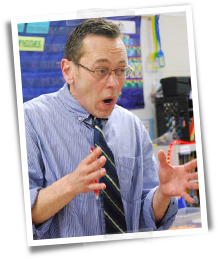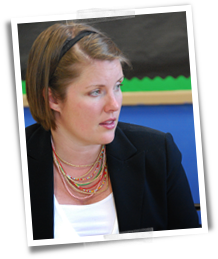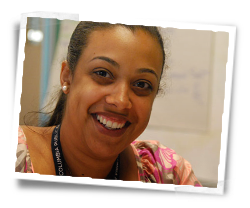


You can learn a lot about effective teaching by talking with great teachers and watching them in action. You can also learn a lot about how teachers become good.
In the two school districts where I did most of the reporting for this project, I sought out teachers who are considered masters by their peers and supervisors.
In Chattanooga, Tennessee, I found Joe Curtis because of the big gains in test scores that students make in his class. Curtis is a lead teacher at Hardy Elementary School in Hamilton County. He teaches math to fifth graders in the morning, then spends the rest of his day helping other teachers learn to teach better.
In Washington, D.C., I found Melanie Agnew and Maggie Thomas. Agnew teaches English at Coolidge Senior High School. She also teaches a seminar for new teachers. Maggie Thomas works as a "master educator" for the D.C. public schools. Her job is to observe and evaluate other teachers. She used to teach fifth and sixth grades.
All three of these teachers say there is a "myth of genius" that surrounds great teaching. They don't buy it.
"I don't believe in Mr. Holland magic," Agnew says, referring to the 1995 movie about an extraordinary music teacher, "Mr. Holland's Opus." "I don't think students learn because of your charm or some innate ability." Teaching is something you have to work at really hard, she says. "And it's detailed work, and I think that you can learn that work. But like with any craft you have to come in with a disposition and a willingness to learn."
Agnew says the learning curve is steep the first few years of teaching. There is a lot to learn, fast, under stressful conditions.
"I fell flat on my face those first couple months," Maggie Thomas says. And she had studied to be a teacher in college. "I knew the fundamentals. I knew Piaget (an influential theorist), but I did not know how to handle one of my students who was suffering from severe anger issues."
Learning how to manage a class and deal with discipline is one of the most important things to master right away, Joe Curtis says. He gives a quick look and a stern warning as soon as a student begins to get out of line. The disruptive behavior usually stops. Curtis can't tell you how he learned to do this. In fact, his answers to most questions about how he became a great teacher are either "hard work" or "experience."
Curtis also talks about the importance of mentors. "When I started I had 35 kids in a room, and didn't know some days whether I was coming or going," he says. "Had no support. Maybe once a month a supervisor would come by and check on me."
He knew he needed more than that, so he looked for mentors. Maggie Thomas says she found a master teacher right away. She would visit this teacher's class. "I would just watch her," Thomas says. And sometimes the master teacher would come watch Thomas. "Afterwards she would tell me, 'That lesson was so boring! I almost fell asleep. You can't expect sixth graders to sit around for 60 minutes and learn the fundamentals of fractions. It's too boring. Spice it up! What can you do?'"
When Thomas evaluates teachers in the D.C. schools, there are a few key things she looks for. A big one is "rigor." She says good teachers get their students to think. "They're not like — 'look up the word integrity and write it five times and put it in a sentence.'"
Planning and pacing are also essential. "A well–organized lesson is quick paced to a point where students are never left with nothing to do," Thomas says.
Melanie Agnew says there are qualities that make some teachers better than others. "One of them is patience," she says. "I think another one is reflection. And I think another one might be…" She pauses for the right word. "Humility," she says. "You know, being able to look at your weaknesses and faults in a constructive way and sort of let go of things when the evidence in front of you is that [they're] not working."
There's a significant body of research that shows teachers learn a lot in their first few years and then plateau. After about year three, they don't seem to get much better. The teachers I talked with don't think that makes sense. Some researchers agree. Deborah Loewenberg Ball at the University of Michigan cites evidence from Japan where teachers continue to get better long after their first few years. She says in Japan, teachers get good, ongoing professional development. In the United States, most teachers don't. The kind of work that Agnew and Thomas and Curtis do helping other teachers is an exception. Most teachers are expected to figure out teaching on their own.
"Teachers are left to learn in their isolated classrooms," says Susan Moore Johnson, a researcher at Harvard. Imagine how much more America could get from its teachers, she says, if schools took seriously their need to learn.

























